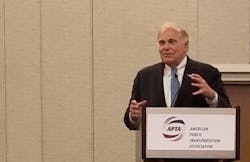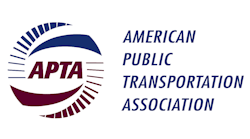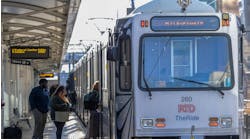The paradigm shift of the public transportation industry and today’s mobility evolution were key discussion points at the American Public Transportation Association’s Legislative Conference In Washington, D.C., March 19-20. The advent of new players in the public transportation space and technology transforming passenger options, the first-ever mobility summit will be held July 12 in Washington, D.C. at the APTA office.
Over the course of the conference, the need to evolve the industry’s operation, the importance of partnering with the companies coming into the public transportation arena, and the imperative of being the leader in the community for mobility management were some of the dominating reoccurring themes.
There didn’t seem to be any question that those objectives need to be met.
But getting there without the resources to maintain the necessary services in a safe format was the bigger question.
Edward Rendell, co-chair of Building America’s Future Educational Fund the former governor of Pennsylvania, stated, “You cannot do something about transportation infrastructure without facing up to the harsh reality that the gas tax is going broke. You can talk all you want about every other proposal … but unless you do something about highway transportation fund, all of it is going to go down the tubes.”
He said the polarization in politics isn’t killing us, it’s that everyone in office cares about protecting their office. He also said if there was a secret house vote on a gas tax increase, it would get all the votes.
“I’m embarrassed at my profession,” Rendell said. “Politicians. Because they won’t cast the tough vote even when they see data.
“People with the least amount of clout use transit, that’s why it gets the shortest end of the stick all the time,” he added.
During the opening session, APTA President & CEO Paul Skoutelas mirrored that sentiment saying, “It’s never been easy for public transit. We’ve always been the underdogs.”
Being the underdogs requires the industry to be out there making sure people understand what we’re about and what we’re asking for.
He said, “We’re looking for more investment in public transportation. Only you can tell you story with the authenticity you have back home.
Nathaniel P. Ford Sr., APTA chair and Jacksonville Transportation Authority chief executive officer, said APTA is working with its partners to galvanize the message about the importance of investment in public transportation.
He said revolution has always been led by the poorest with nothing to lose. He shared, “Our founders had everything to lose. The Declaration says we pledge our lives, our fortunes and our sacred honor. They knew the stakes. If they lost they'd be hung.”
He continued, “Hancock signed first and was asked why his signature was so large. And he said so King George could see it and would hang me first.”
Rendell said, “Keep explaining to our representatives that it’s OK to vote for something that our Chamber of Commerce and AFL-CIO both agree. A 25-cent gas tax increase.”
He said the $345 billion over 10 years is close to the real estate tax break, which was $341 billion over 10 years. He pointed out the real estate tax break was for about 1,000 real estate developers. “We’re asking for $345 billion for 330 million Americans. It doesn’t seem that tough.”
Skoutelas said when the U.S. Chamber of Commerce came out with the gas tax increase proposal, APTA didn’t hesitate to sign on to that pointing out the chamber’s stance is reflective of the sentiments of the businesses in communities. “The largest businesses in the United States are saying we need to invest in the gas tax for surface transportation,” he stressed.
Transit supporters have to keep explaining to legislators that the people will stand with them, with the last year of transit referendums being an example. In 2017, nearly 90 percent of transit ballot initiatives passed. Rendell said of voters, “They know it is the key to their economic livelihood.”
The Hoover Dam was built in 1930, he pointed out. “Almost 100 years ago,” he said. And it’s still providing benefits, still providing energy to many western states. He continued, “You build something, it has benefits for decades, decades and decades.
“Most commuter railroad bridges in Philadelphia are over 100 years old,” he said. When you pay for infrastructure, you are investing, you’re not spending money.
Rendell said, “Give our legislators a permission slip. We are not going to vote against you if you raise our taxes on this.
“If we want to stay great, this is something we have to do. We have no choice,” he said. “We were built by risk takers, now it’s up to us.”




